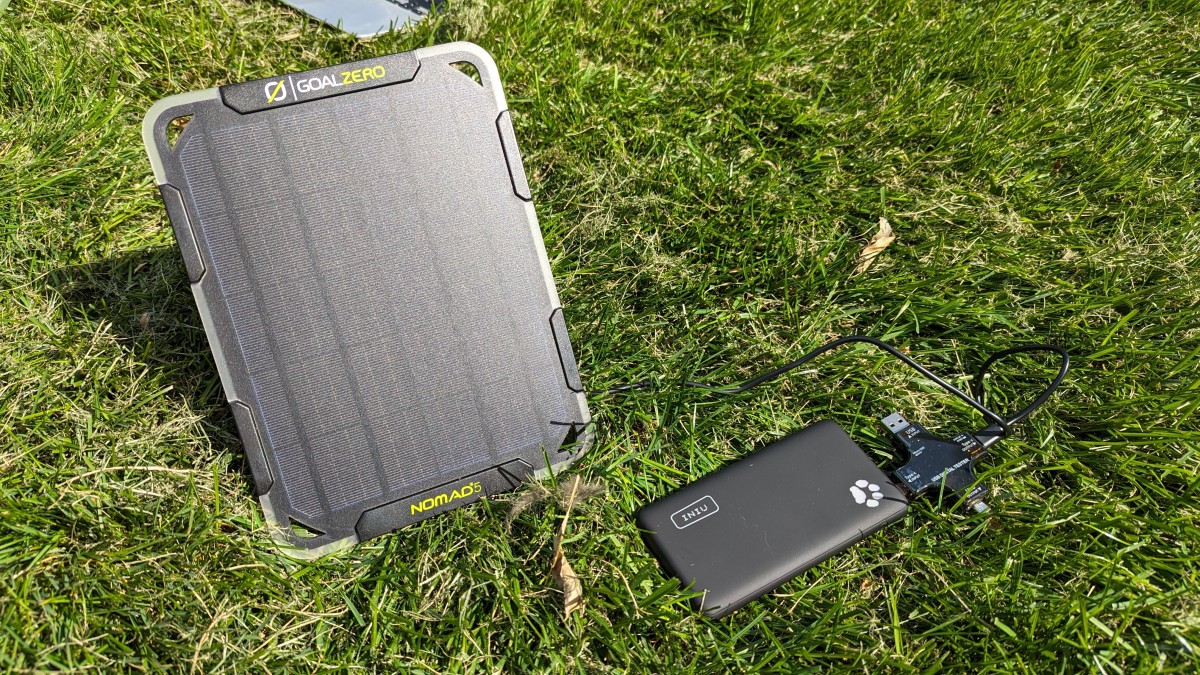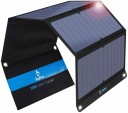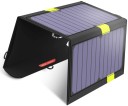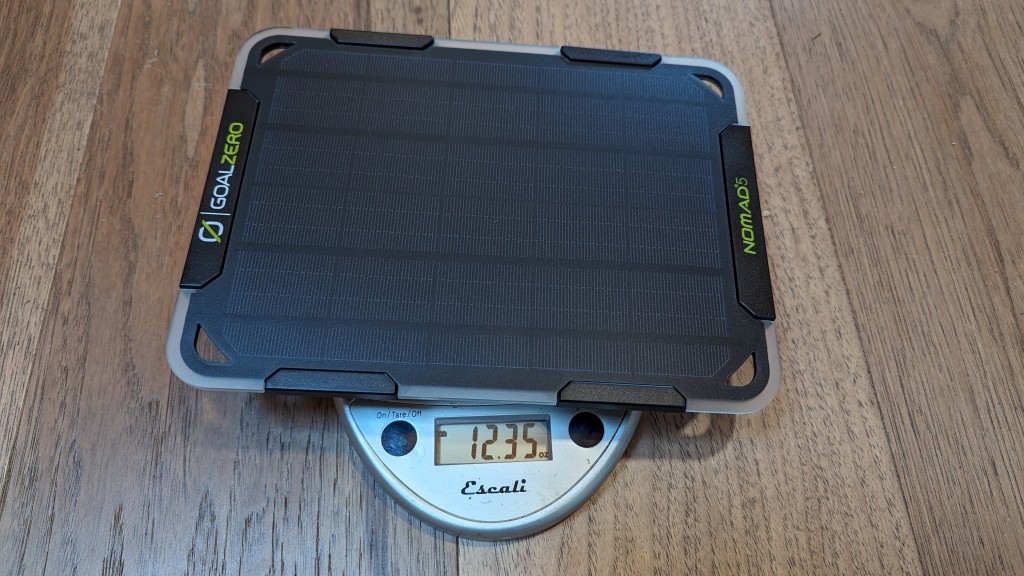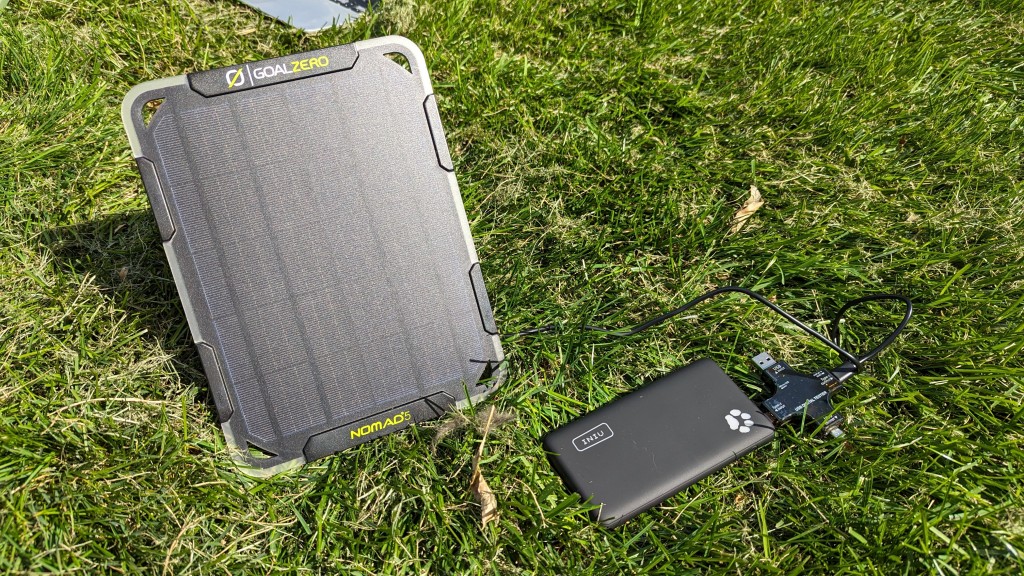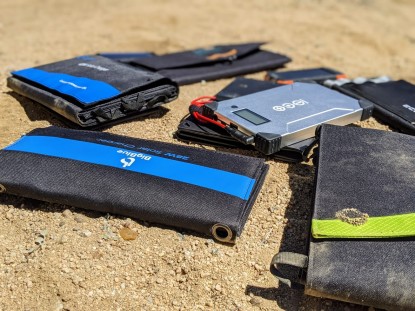Our Verdict
Compare to Similar Products
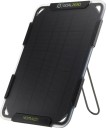 This Product
Goal Zero Nomad 5 | |||||
|---|---|---|---|---|---|
| Awards | |||||
| Price | Check Price at REI Compare at 2 sellers | $70 List $72.99 at Amazon | $57 List $56.99 at Amazon | $80 List $79.95 at Amazon | $30 List |
Overall Score  |
|||||
| Star Rating | |||||
| Bottom Line | This panel is small and light enough that you'll always want to carry it with you | For an easy-to-use and efficient solar charger, this panel will keep your tech charged | This panel works well as a portable solar charger and costs less than the competition | This portable solar charger has average charging speeds and is very durable | This battery bank holds 20,000 mAh of charge, but you'll have to wait weeks to charge it via solar |
| Rating Categories | Goal Zero Nomad 5 | BigBlue SolarPowa 28 | X-Dragon 20W | SunJack 25W | Errbbic 20000mAh Wa... |
| Direct Solar Charging Speed (35%) | |||||
| Indirect Solar Charging Speed (35%) | |||||
| Portability (15%) | |||||
| Functionality (15%) | |||||
| Specs | Goal Zero Nomad 5 | BigBlue SolarPowa 28 | X-Dragon 20W | SunJack 25W | Errbbic 20000mAh Wa... |
| Power Output (Watts) | 5 W | 28 W | 20W | 25 W | <5 W |
| Energy Generated in 1 Hour Direct Sun | 318 mAh | 1849 mAh | 1043 mAh | 624 mAh | 14 mAh |
| Energy Generated in 1 Hour Indirect Sun | 65 mAh | 919 mAh | 535 mAh | 105 mAh | 0.001 mAh |
| # of USB A Outlets | 1 | 3 | 2 | 1 | 2 |
| # of USB C Outlets | 0 | 0 | 0 | 1 | 0 |
| Max USB Output Current (Amps per Port) | 1 amp | 2.4 amp | 3 amp | 2 amp | 2.1 amp |
| Weight (Measured) | 12.35 oz | 20.9 oz | 21.7 oz | 29.4 oz | 8.7 oz |
| Size Folded | N/A | 11 x 6 x 1.5 in | 12.1 x 7.2 x 0.51 in | 12.6 x 7.8 x 0.8 in | N/A |
| Size Opened | 9.5 x 7 x 0.8 in | 31 x 11.5 x 0.2 in | 23.3 x 12.1 x 0.12 in | 24.6 x 7.8 x 0.8 in | 5.5 x 3 x 0.75 in |
| Battery Included | No | No | No | No | Yes |
| Battery Capacity (mAh) | N/A | N/A | N/A | N/A | 20,000 mAh |
| Tablet Charging | No | Yes | Yes | Yes | Yes |
| Laptop Charging | No | Yes | No | No | No |
| Charge iPhone/Smartphone | Yes | Yes | Yes | Yes | Yes |
| Panel Exterior Material | Hard plastic | Polyester Oxford fabric | PTFE | PET polymer fabric | Plastic |
| Panel Type | Monocrystalline | Monocrystalline | Monocrystalline | Monocrystalline | Monocrystalline |
| Battery Input (Volts / Amps) | N/A | N/A | N/A | N/A | 5.1V/1.9A |
| USB Output | Yes | Yes | Yes | Yes | Yes |
| Able to Daisy Chain | No | No | No | No | No |
| 12-Volt Connection | No | No | No | No | No |
| DC Output | No | No | No | No | No |
Our Analysis and Test Results
The Goal Zero Nomad 5 is a lightweight 5-watt mono-crystalline solar panel that weighs 12.35 ounces. It measures 9.5 inches long, seven inches wide, and 0.8 inches thick, with a small kickstand to set it at an angle. It has a single USB-A port providing one amp of electrical current to power your device.
Performance Comparison
Direct Solar Charging Speed
The 5-watt, Nomad 5, is lightweight, portable, and actually works as a solar panel should. It isn't the most powerful, but it's powerful enough, considering its tiny size. There are a lot of lightweight, small solar panels out there — we know because we've tested most of them.
However, most of these panels don't work very well to convert solar energy into electricity and rely on their battery packs to carry you through, making them glorified portable chargers. If this seems antithetical to you, you aren't alone. The Nomad 5 stands apart in a sea of small “solar panels” because it actually works as a solar panel should.
Compared to other 5-watt solar panels, the Nomad 5 is incredibly efficient in direct solar charging. It produces enough power to keep your devices topped off, and while 5 watts of capacity isn't very large, it does a good enough job considering its small size. It's considerably more powerful than all the lower-watt panels we tested. It charged our 10,000 mAh battery almost as much as some panels rated as 20 watts. On a sunny Colorado day at 5,000 feet above sea level, the Nomad 5 generated 318 mAh of charge in our direct side-by-side comparisons. That's twice as much charge as basically every other 5-watt solar panel we tested.
Indirect Solar Charging Speed
The more powerful, larger panels seem to excel in indirect charging, while smaller panels struggle to produce any power under the clouds. This is the case with the Nomad 5 too. During indirect solar charging, all the small panels saw a massive drop in energy output, including the Nomad 5.
To measure indirect solar charging speed, we suspended a white sheet above all the panels and repeated the direct solar charging speed test in conditions simulating a cloudy day. This test showed a strong correlation between actual panel size and solar charging effectiveness in partial light.
On a hot day in Colorado, 5,000 feet above sea level, under a white sheet, the Nomad 5 generated 65 mAh of charge in its 10,000 mAh test battery in one hour. This wasn't as much charge as during the direct solar charging test, but it's more of a charge than any other smaller panel we tested and over half as much as some 25-watt panels. And considering that a majority of the 5-watt panels we tested failed to register any charge at all in these conditions, we'll take what we can get with the Nomad 5.
Ultimately, if you frequently need to stay charged on a cloudy day, you're better off getting a larger panel that can more effectively convert even the small amounts of sunlight that filters through the gloom. The Nomad 5 would take the better part of a day to recharge a cell phone in cloudy conditions — if it managed it at all.
Portability
The Nomad 5 is one of the most portable panels we tested. It's not the smallest or quite the lightest, but it's definitely light enough to throw in your bag — just in case — or carry on a backpacking trip.
The Nomad 5 weighs just over 12 ounces. This is lighter than all but the smallest panels we tested. It doesn't fold and is super thin. It's possible to slide this panel into even the most jam-packed bag. We carried this while backpacking and often left it strapped to the top of our pack, garnering a little bit of charge even while we walked. It's small and light enough that we didn't notice it strapped on top, and it definitely didn't imbalance our packs.
The Nomad 5 has a strong plastic backing, so it doesn't bend. It's not quite indestructible, but the build quality inspires confidence, even as we tossed it around a box full of other hard objects, shuffled it around in our tents, and jammed it in our packs.
There is nothing covering the single USB output, though. We can't help but wonder if this exposed USB port might eventually get enough debris in it that it stops working. For this reason, we preferred to keep a USB cord plugged into the output jack. Of course, then there's a cord dangling off the panel, which isn't ideal for carrying it around, though it does allow you to keep your phone charging all day while you hike.
Functionality
The Nomad 5 is a highly functional panel overall. There is a leg that folds out so you can prop the panel to angle it towards the sun. This is pretty unique among portable solar chargers, surprisingly. Other than the fold-out leg, though, it's a fairly basic solar panel.
A basic solar panel isn't a bad thing in this case. This model's primary function is to be a highly portable, easy-to-use solar panel. The Nomad 5 achieves this goal.
The fold-out leg is simple and sturdy. It's a hinged metal loop that's more than strong enough to support the low weight of the panel. It didn't tip over in strong gusts of wind, even though the supporting leg is narrow where it contacts the ground. The panel doesn't seem to be heavy enough to tip over in moderately windy conditions, and this kickstand leg definitely helps.
It only has one USB output, so you can't charge multiple devices simultaneously with the Nomad 5. However, this panel isn't powerful enough to charge multiple gadgets, and two USB outputs would take away from the simplicity that makes this panel stand out.
Should You Buy the Goal Zero Nomad 5?
If you're looking for the lightest possible solar panel that will still effectively charge your devices, you should consider the Nomad 5. It's featherlight, thin, and very durable, so it's well-suited for those often on the go. And it's relatively affordable, too. It's not the most powerful portable solar charger, but that's no surprise considering its small size. If you need a lot of charging capacity or to charge multiple devices, this probably isn't the best option. It will work to keep a single electronic device topped off, but it won't keep an entire mobile office charged.
What Other Portable Solar Chargers Should You Consider?
If you're looking for a higher-watt solar charger that is still pretty portable, check out the BigBlue SolarPowa 28. This panel weighs about twice as much as the Nomad 5 but puts out 6-12 times more power. If you're looking for a small solar panel that's about as light but also has an integrated battery bank, check out the BioLite SolarPanel 5+. It doesn't charge as well in the sun or under the clouds, but the battery backup can keep you covered for light use.


